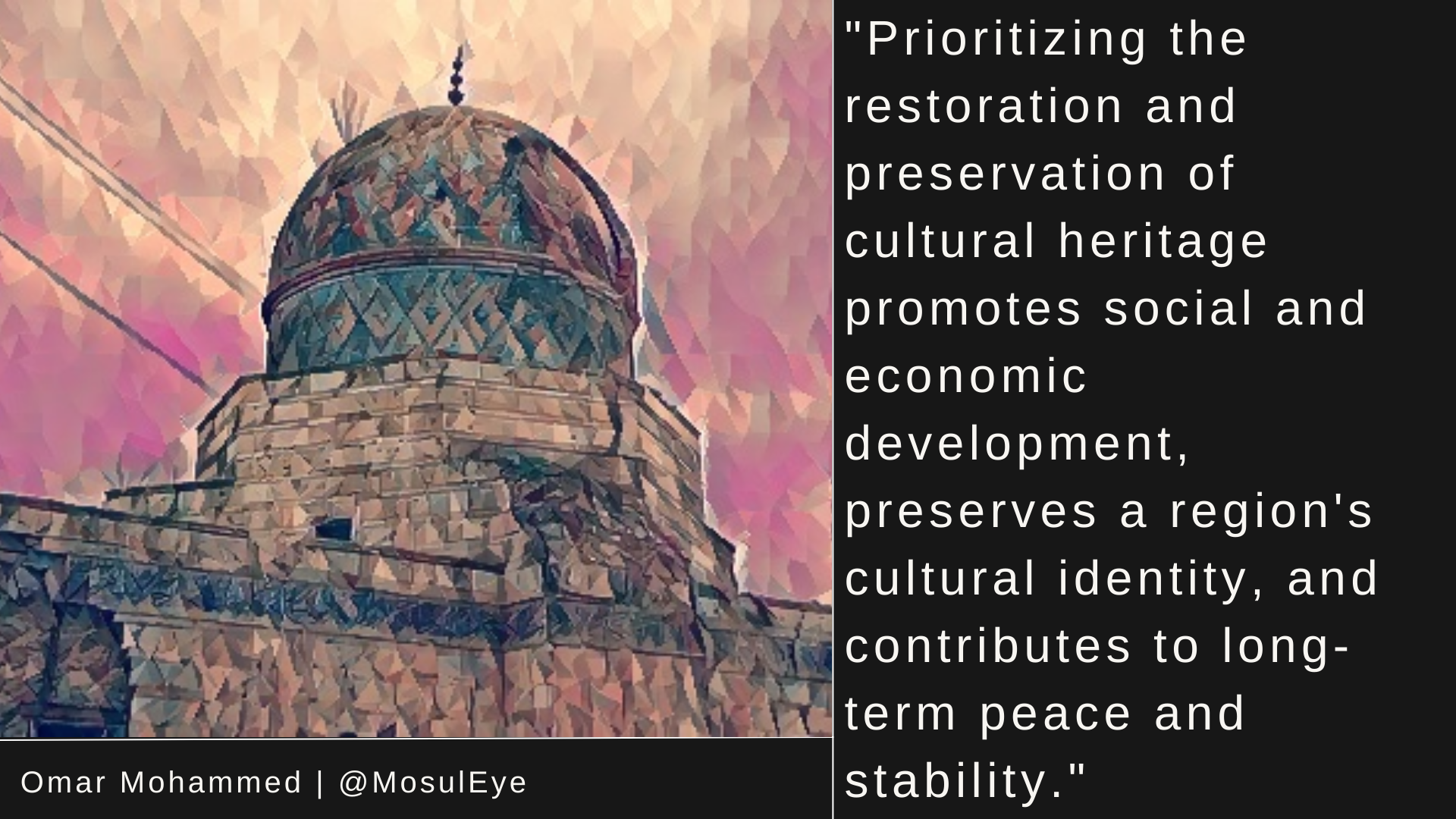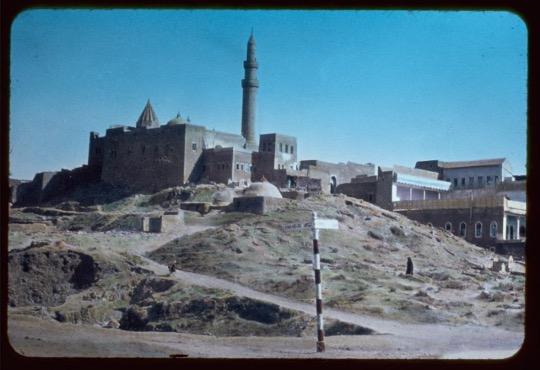The destruction of cultural heritage in conflict-affected regions by extremist groups seriously threatens global peace and stability. It is essential to rethink the importance of cultural heritage in counterterrorism strategies and develop policies that prioritize the restoration and preservation of cultural heritage sites. This article discusses the social, economic, and historical impact of the destruction of the cultural heritage by ISIS in Mosul, and the Revive the Spirit of Mosul project that aims to rebuild the Great Mosque of al-Nuri. The article also highlights the role of cultural heritage in countering extremist ideologies and provides policy recommendations for protecting cultural heritage in conflict-affected regions. The recommendations include developing a coordinated international strategy to protect cultural heritage, prioritizing the restoration and preservation of cultural heritage sites, promoting the role of cultural heritage in countering extremism, involving local communities, and strengthening international legal frameworks. Prioritizing the restoration and preservation of cultural heritage promotes social and economic development, preserves a region's cultural identity, and contributes to long-term peace and stability.
A Brief Overview of the Destruction of Cultural Heritage in Mosul by ISIS
In 2014, ISIS militants took over Mosul, one of the oldest cities in Iraq and home to significant cultural and historical landmarks. In the years that followed, the world watched in horror as ISIS systematically destroyed many of these precious landmarks, including the ancient city walls, the Tomb of Jonah, and the Great Mosque of al-Nuri.
At first glance, this destruction may appear to be random acts of violence. However, closer examination reveals ISIS’s strategy to destroy the cultural heritage of Mosul to obliterate the past and control the city's future. ISIS sought to create a blank slate onto which they could project their beliefs and values by eliminating the physical remnants of the city's past. In this way, ISIS was attempting to erase the city's history and replace it with its own narrative that glorified their extremist ideology and demonized all others. ISIS used this strategy to control the future of Mosul by intimidating and terrorizing the city's residents to forget its past. Destroying the city's cultural heritage created a sense of fear and hopelessness among the people of Mosul. ISIS hoped that by erasing the city’s collective past, they could create a future in which they would be the sole arbitrators of power.
The destruction of cultural heritage in Mosul by ISIS has had a profound impact not only on the city's past and future, but also on the world. The loss of precious landmarks has deprived humanity of irreplaceable historical and cultural treasures. Moreover, the destruction of cultural heritage in the region has contributed to destabilization by exacerbating existing conflicts which subsequently makes the task of rebuilding and reconciliation even more challenging.
It is essential that we understand the dangerous impacts of ISIS destroying cultural heritage. We must recognize that cultural heritage is not just a matter of historical significance, but also a powerful tool for promoting peace, tolerance, and understanding. In destroying cultural heritage, ISIS sought to erase the diverse and complex identities of the people of Mosul and to replace them with a singular, monolithic identity based on their extremist ideology. Therefore, rebuilding the cultural heritage of Mosul should be an integral part of the counterterrorism strategy to restore the city's past and to create a more hopeful future for its residents. It will also send a powerful message to extremist groups, like ISIS, that their attempts to erase the history and culture of a people will not succeed because the world is committed to preserving and celebrating the diversity of human cultures.
Ancient city walls of Mosul before destruction by ISIS forces.
The Social Impact of Destroying Cultural Heritage in Mosul
The social impact of the destruction of cultural heritage in Mosul was profound, particularly for the city's residents. In the short term, the destruction of the city's landmarks created a sense of fear and helplessness among the people of Mosul, many of whom were forced to flee their homes and leave their communities behind. The loss of cultural heritage also meant the loss of cultural identity for many residents of the city, which was particularly devastating for those who had lived in Mosul for generations.
The destruction of cultural heritage has also caused significant damage to the economies of cities, like Mosul, that depend on cultural tourism. Local businesses have suffered without cultural heritage sites to attract visitors, leaving the city's economic future remains uncertain. This is particularly devastating as the country rebuilds itself from the conflict.
The destruction of local Mosuli sites also impacted the world’s collective understanding of history and cultural identity. The destruction of the ancient city walls, the Tomb of Jonah, and the Great Mosque of al-Nuri has erased significant historical and cultural landmarks which ultimately deprive the world of a sense of history and continuity. Further, it leaves communities vulnerable to extremist groups seeking to manipulate the historical record for their purposes.
ISIS's destruction of cultural heritage in Mosul has had far-reaching social, economic, and historical consequences. The loss of cultural heritage has deprived humanity of irreplaceable historical and cultural treasures and has contributed to the region's continued destabilization. It also left a void in our understanding of the past, creating a gap that will be difficult to fill. However, by prioritizing the rebuilding of cultural heritage sites in Mosul and other regions affected by conflict, we can promote peace, tolerance, understanding, and prevent the spread of extremist ideologies.
Tomb of Jonah before destruction by ISIS forces.
The Example of al-Nuri Mosque and the Revive the Spirit of Mosul Project
Rebuilding the cultural heritage of Mosul and other areas affected by conflict should be an integral part of the counterterrorism strategy for several important reasons.
Firstly, the destruction of cultural heritage is often carried out as part of a broader strategy to erode the identity of a particular community or region. Extremist groups seek to create a void that they can fill with their narratives and ideologies by erasing the physical and cultural remnants of a community's past. This erasure of cultural heritage causes not only significant damage to a community's social fabric but also allows extremist groups to manipulate the historical record to their advantage. Rebuilding cultural heritage can help to restore a community's sense of identity and undermines the ability of extremist groups to spread their ideology.
Secondly, rebuilding cultural heritage is essential for promoting peace and stability in conflict-affected regions. Shared heritage is essential to a community's social and economic fabric, and its destruction can have significant economic and social consequences. The loss of cultural heritage sites can damage the economies of communities and the livelihoods of individuals that depend on tourism. Rebuilding cultural heritage promotes economic stability and provides individuals with new opportunities to participate in the local economy.
Finally, rebuilding cultural heritage is essential to the reconciliation process in conflict-affected regions. The destruction of cultural heritage often exacerbates tensions between communities, particularly when cultural heritage is closely tied to a particular ethnic or religious group. Rebuilding cultural heritage creates a platform for dialogue and promotes greater understanding and tolerance between different communities.
The Revive the Spirit of Mosul Project: Promoting Social and Economic Development, Preserving Cultural Identity, and Contributing to Long-Term Counterterrorism Strategy
The Revive the Spirit of Mosul project aims to rebuild the Great Mosque of al-Nuri and has significant implications for social and economic development in the region. The project can help create a more stable and prosperous future for the people of Mosul by restoring the city's cultural heritage.
The project promotes social and economic development by creating job opportunities for the city's residents. The reconstruction of the mosque, a new cultural center, and a new museum have provided employment opportunities for many people in the region, which is particularly important given the economic challenges Mosul faced after years of conflict. By providing employment opportunities, the project can contribute to economic stability and provide a platform for local people to participate in the rebuilding of their city.
Moreover, restoring cultural heritage also has significant implications for preserving the city's diverse cultural identity. The project is sending a message to the world that the people of Mosul are committed to preserving their cultural heritage sites and promoting diversity and tolerance. This message is essential given the efforts of extremist groups, like ISIS, to impose their narrow vision of culture and history on the region.
In addition, this project is helping to contribute to the long-term counterterrorism strategy by promoting stability and countering extremist ideologies. The project is creating a sense of continuity and preserving the historical and cultural identity of the region. The preservation of cultural identity is essential for countering the extremist ideologies that seek to erase the history and cultural diversity of the region. The project also promotes peace, tolerance, and understanding, which are essential for countering extremist ideologies that thrive on fear, division, and hatred.
Overall, the Revive the Spirit of Mosul project is restoring the Great Mosque of al-Nuri's physical structure, contributing to regional social and economic development, preserving the city's diverse cultural identity, and countering extremist ideologies. By promoting the restoration of cultural heritage, the project is creating a more stable and prosperous future for the people of Mosul and contributing to the international community's efforts to counterterrorism and promote peace and stability in conflict-affected regions.
The remnants of the Great Mosque of al-Nuri after destruction by ISIS forces.
Policy Recommendations
- Develop a coordinated international strategy to protect cultural heritage in conflict-affected regions. This strategy should involve collaboration between governments, international organizations, and civil society groups to identify at-risk cultural heritage sites and develop a coordinated response to protect them.
- Prioritize the restoration and preservation of cultural heritage sites in counterterrorism efforts. This should involve allocating resources to support the restoration of damaged cultural heritage sites and preserve the cultural heritage in conflict-affected regions.
- Promote the role of cultural heritage in countering extremist ideologies. This should involve raising awareness of the importance of cultural heritage in preserving a region's history and cultural identity, and the role it can play in promoting peace, tolerance, and understanding.
- Involve local communities in the restoration and preservation of cultural heritage sites. This should involve empowering local communities to take ownership of the restoration and preservation of their cultural heritage by involving them in decision-making processes about the future of cultural heritage sites in their region.
- Strengthen international legal frameworks for protecting cultural heritage in conflict-affected regions. This should involve strengthening international law and institutions that protect cultural heritage sites and hold those responsible for their destruction accountable.
In conclusion, the restoration and preservation of cultural heritage in conflict-affected regions should be an integral part of counterterrorism strategies. Prioritizing the restoration and preservation of cultural heritage promotes social and economic development, preserves a region's cultural identity, and contributes to long-term peace and stability. To achieve these goals, we must develop coordinated international strategies, prioritize the restoration and preservation of cultural heritage sites, raise awareness of the role of cultural heritage in countering extremism, involve local communities, and strengthen international legal frameworks for protecting cultural heritage.





